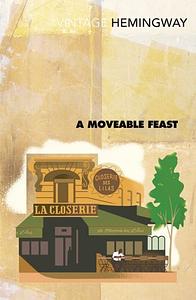Take a photo of a barcode or cover
This was the first time I have read a book by Ernest Hemingway in a long time, and it wasn't very good, which makes me wonder how good those books I really liked when I was 19 actually were. There were some strange and fun details, though, like Hemingway's justification of leaving his kid at home with the cat while he went to cafe, and Hemingway's account of how he tried to make F. Scott Fitzgerald feel better about the size of his penis.
Interesting glimpse into a time and a place I would have been interested in experiencing.
I am not much of a fan of Ernest Hemingway’s work but this collection is highly enjoyable. I love the recollections of Hemingway’s life and times in 1920s Paris. This could be my own love of expat life and belief I may well have been happier in an earlier time, though I imagine Hemingway writing these sketches later in his life, feeling wistful and nostalgic for a youth gone by, and really that is was struck me hardest. There is a hilarious interaction between Hem and a hypochondriacal Scott Fitzgerald that had me in stitches.
“There is never any ending to Paris and the memory of each person who has lived in it differs from that of any other. We always returned to it no matter who we were or how it was changed or with what difficulties, or ease, it could be reached. Paris was always worth it and you received return for whatever you brought to it. But this is how Paris was in the early days when we were very poor and very happy.” ♡♡♡♡♡
“But this is how Paris was in the early days when we were very poor and very happy.”
This definitely isn’t a typical book to pick up on a whim, although that’s what I did. It contains brief stories about different people in Hemingway’s life through Paris. It’s very slow-paced, but it’s a very relaxing summer read. I specifically love how it avoids frames being poor as an inherently negative aspect of life, and I love how much commentary on class perspectives is put here.
This definitely isn’t a typical book to pick up on a whim, although that’s what I did. It contains brief stories about different people in Hemingway’s life through Paris. It’s very slow-paced, but it’s a very relaxing summer read. I specifically love how it avoids frames being poor as an inherently negative aspect of life, and I love how much commentary on class perspectives is put here.
I know rationally that this is Hemingway canonizing his Paris experience with serious bias, but boy he can make you sympathetic to his cause:
I bought this because it was about Paris (I've been slightly obsessed with it lately) and because for some time I've wanted to try Hemingway. Perhaps I need to try something else for this didn't impress me at all. There are certainly writers who write really well with almost no descriptions and with a very few words but Hemingway (in this case) just wasn't one of those. His writing style is incredibly boring. There was so much potential to write an amazing piece of memoir considering who he hanged out with but now it fell short.
“do not worry. you have always written before and you will write now. all you have to
do is write one true sentence. write the truest sentence that you know.”
do is write one true sentence. write the truest sentence that you know.”
Full of interesting anecdotes about famous folks of the day, and written in oh-so-Hemingway style. Sometimes it almost reads like a Hemingway parody, but it's delightful to read something with such a clear voice. Not a page-turner, but I feel like a more educated person for having read it.
I enjoyed reading A Moveable Feast. I love all things Paris and to me, almost every word written by Ernest Hemingway is romantic. There is something beautiful about his prose. While I throughly enjoyed the book I did not give it 4 stars because in typical Hemingway fashion it lacks certain details and I am just not that familiar with Paris in the 1920s. I couldn't look every thing up so I continued along. I read reviews that criticize the book for how long he described Gertrude Stein F Scott Fitzgerald and the famous scene where he asks Hemingway to answer him truly. I took his description of these writers to be his true feelings at the time, though maybe bitter. I think the mistake here is that he is placed on a pedestal and it seems wrong for him to paint them in such a light. However, if that's what he felt then so be it. I am not here to judge, simply to enjoy the book.





